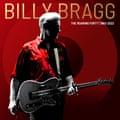In his 2010 history of protest music, 33 Revolutions Per Minute, Guardian writer Dorian Lynskey makes a bold claim about Billy Bragg: “If you ask someone to name a British protest singer,” he writes, “there is invariably only one response.” It says something about Bragg’s longevity. He has been a fixture of alternative music and leftist politics for so long that it’s worth noting how unlikely it seemed, during his first flush of fame, that he would ever warrant a compilation celebrating the 40th anniversary of his solo career . Much less one that, in its most expansive “super deluxe” iteration, stretches to 14 CDs. (A two-disc set is also available, as is a three-disc vinyl version.)
It’s not that Bragg wasn’t popular or critically acclaimed – his second album, 1984’s Brewing Up With Billy Bragg, made the Top 20; the following year’s Between the Wars EP put him on Top of the Pops – it’s that he seemed very much an artist of his time, and artists who seem welded to one moment in history usually struggle to transcend it.
Brewing Up and its predecessor, Life’s a Riot With Spy Vs Spy, may be the definitive musical artefacts of what you might call The Other 80s – a monochrome, earnest, secondhand overcoat-clad and Doc Martens-shod world of benefit gigs and GLC Jobs for a Change festivals, which has since largely been written out of history by pop cultural nostalgia. Bragg’s early work is politically committed but bleak in outlook – relationships invariably go wrong, the dole queue awaits school leavers, memories of the past skew towards failure and unrequited love – and strikingly austere. So austere, in fact, that when an instrument other than Bragg’s distorted guitar and bellowing voice appears, it feels startling. The brief burst of trumpet on Brewing Up’s The Saturday Boy sounds literally cold, as if recorded in a freezing studio, Bragg’s breath misting before his face.
And yet Bragg did transcend his era, and The Roaring Forty suggests why. On a prosaic level, he gradually augmented his sound until by the time of 1988’s Workers Playtime he was performing with a full band. His lyrics tend to overshadow his skills as a tunesmith or his musical eclecticism, but if you listen to the more manageable two-CD set, you’re struck by how melodically strong and varied his output sounds. Ramshackle country rock recorded with Wilco (his partners in the Mermaid Avenue project, which saw them completing songs left behind by the late Woody Guthrie) sits alongside a brass band-assisted version of the Internationale; keyboard-led southern soul inflections rub shoulders with brooding Smiths-y jangle.
Moreover, he turned out to be a more complex, layered and less didactic writer than he was first taken for. Although he could occasionally be clumsy, wielding well-meaning lyrics as blunt as his voice (his 1991 single Sexuality, for example), and wasn’t above singalong rabble-rousing (as on There Is Power in a Union), usually he was more subtle and intriguing. On paper, Between the Wars – a song lamenting the collapse of the postwar consensus filled with check-the-footnotes references to everything from the Spanish civil war to the Beveridge report – looks like a tough sell. But the end result is a plaintive gut punch. On the songs The Roaring Forty picks from 2002’s England, Half English, Bragg walks a nuanced line between patriotism (“Oh my country, what a beautiful country you are,” concludes the title track) and revulsion at Britain’s imperial past and the notion of unionism. He remains willing to admit to failure and prone to questioning the worth of writing political songs: for example, Waiting for the Great Leap Forward’s battered response to Margaret Thatcher’s third election victory; the disappointment and dejection on Some Days I See the Point.
after newsletter promotion
The Roaring Forty even suggests that Bragg’s real strength as a songwriter might lie away from politics. From its arresting opening line – “With the money from her accident she bought herself a mobile home” – Levi Stubbs’ Tears is a masterpiece of compact, potent storytelling, a particularly grim kitchen sink drama condensed into three and a half minutes and leavened by a chorus about the redemptive power of music. Tank Park Salute, which may be the best song Bragg has ever written, deals with his father’s death during Billy’s teens. Its evocation of memory and regret is so beautiful that it slips any temporal moorings and functions as a universal meditation on father-son relations and the loss of a parent.
He has also managed the rare feat of growing older in tandem with his audience. He’s funny about long-term relationships and domesticity on Handyman Blues (“It takes me half an hour to change a fuse”), honest about feeling increasingly bewildered by the modern world and clinging to positions “as comfy as an armchair” on 2021’s Mid-Century Modern. The latter finds him wondering whether “it might help if I just stepped away”, but of course he won’t. The Roaring Forty makes that decision feel like something worth applauding.
This week Alexis listened to
Bar Italia – Jelsy
Taken from the band’s forthcoming second album of 2023, The Twits, the acoustic guitar-driven Jelsy is lovelorn and lovely, and affectingly weary.

